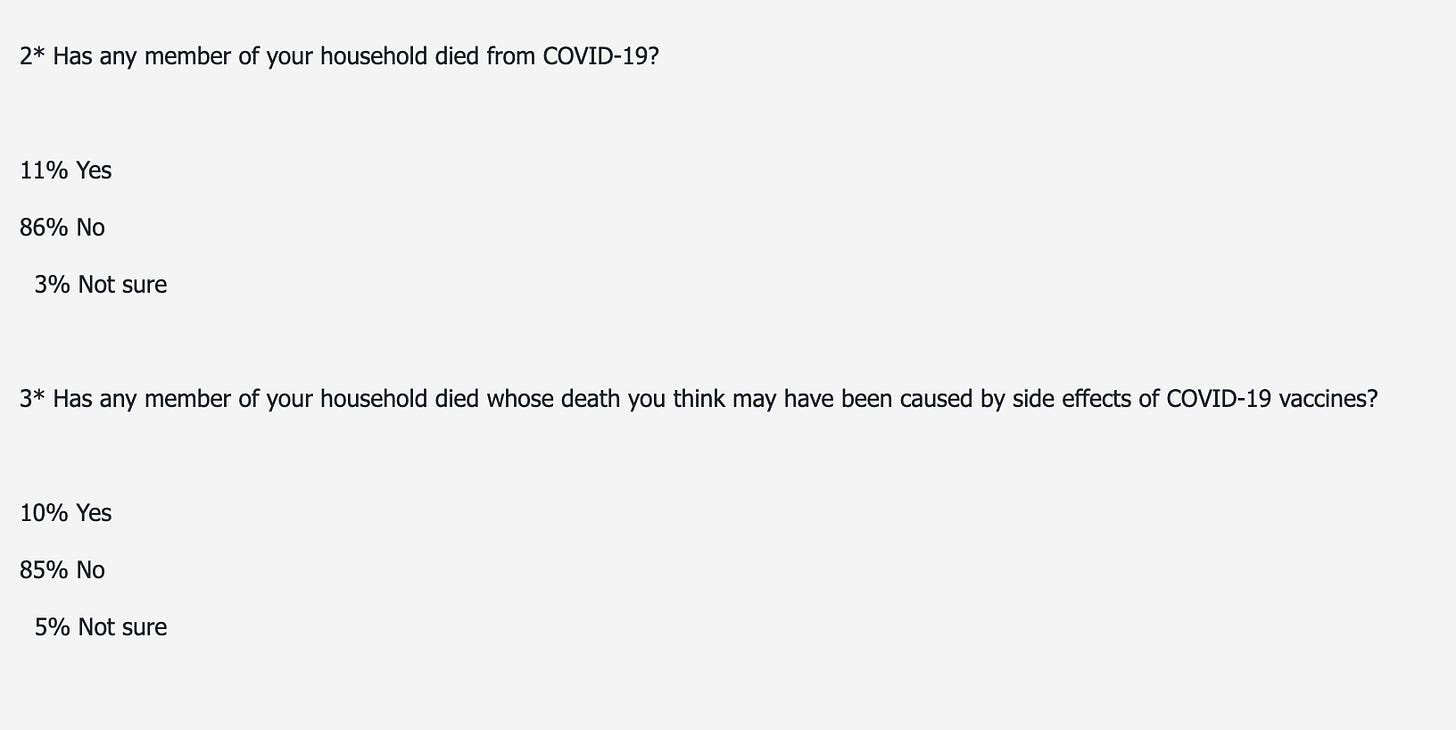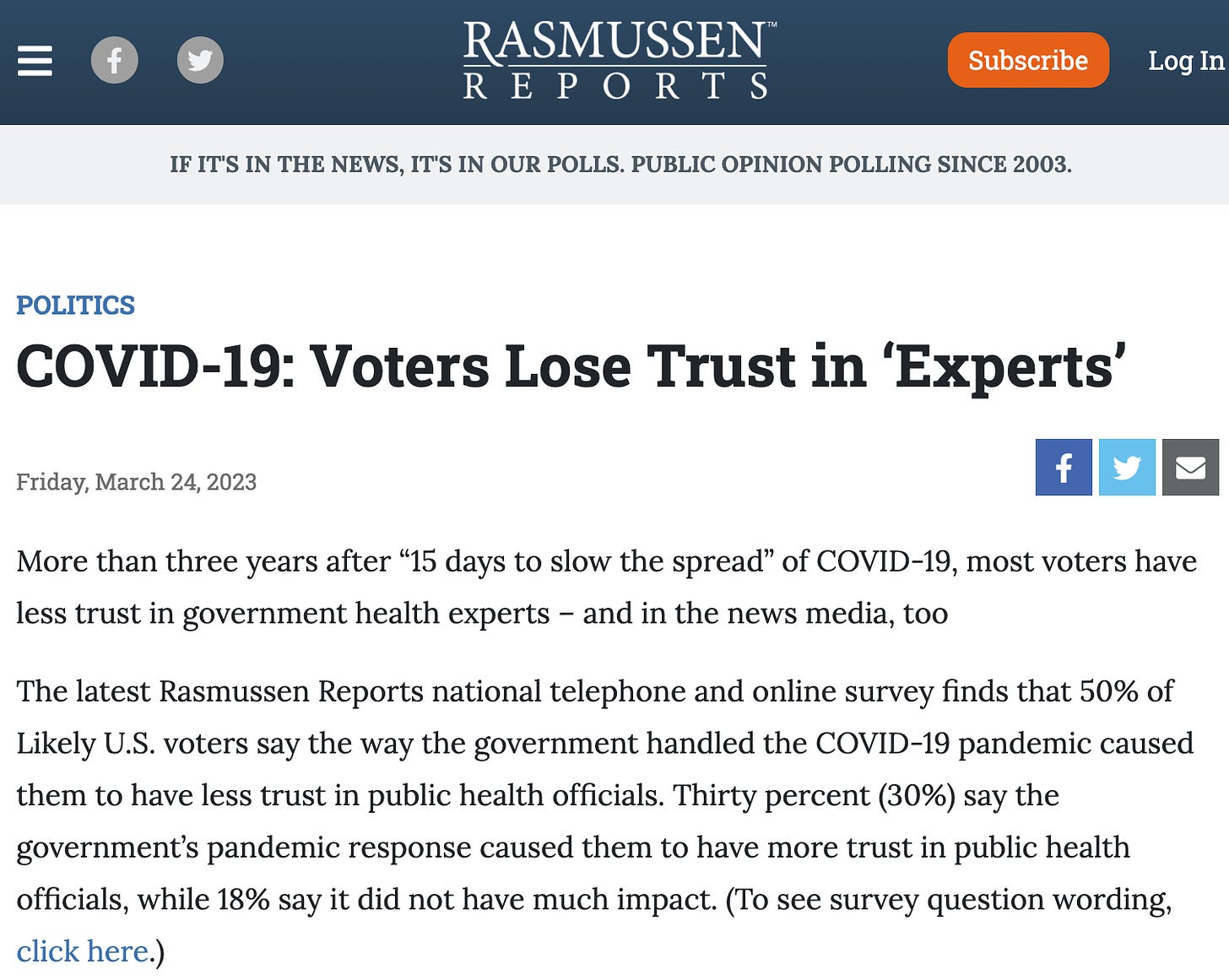Americans believe that "COVID-19: Virus Deaths vs. Vaccine Deaths" are almost the same
Breaking news- New Rasmussen poll results just published
A new poll by Rasmussen has some data that validates what many of us here on this Substack already believe. That the vaccines are dangerous, unsafe and need to be pulled from the market immediately.
Nearly as many Americans believe someone close to them died from side effects of the COVID-19 vaccine as died from the disease itself.
The latest Rasmussen Reports national telephone and online survey finds that 11% of American Adults say a member of their household died from COVID-19, while 86% answer no. Ten percent (10%) say a member of their household has died whose death they think may have been caused by side effects of COVID-19 vaccines, while 85% say there were no such deaths in their household. (To see survey question wording, click here.)
These findings come at a time when overall concern about COVID-19 is clearly on the decline. Forty-eight percent (48)% of Americans are less concerned about COVID-19 than they were a year ago, compared to 20% who say they’re more concerned. Thirty-one percent (31%) say their concern about COVID-19 has not changed much in the past year.
That 10-11% of Americans polled believe that a member of their family died from adverse events from the COVID-19 vaccine is shockingly inconsistent with the approved narrative of “safe and effective” which has been so actively propagated by corporate (“main stream”) media and the US Government.
More Democrats (16%) than Republicans (12%) or those not affiliated with either major party (6%) say a member of their household died from COVID-19. More Republicans (15%) than Democrats (13%) or the unaffiliated (5%) say a member of their household has died whose death they think may have been caused by side effects of COVID-19 vaccines.
The section above is key, because the difference between Democrats and Republicans is almost the same concerning either deaths from COVID or COVID vaccines. If there had been statistical significance between these two groups, Rasmussen would have indicated that.
Please keep in mind that it is now widely accepted that the COVID vaccines available in the United States do not prevent infection, replication, or spread of SARS-CoV-2, and do not prevent either hospitalized disease or death from COVID-19 disease. Given these facts, references to these biologic medical products as “vaccines” is merely aspirational. They clearly do not “vaccinate” in the classic sense.
Other details about the poll:
Fifty-five percent (55%) of Republicans, 43% of Democrats and 45% of the unaffiliated are less concerned about COVID-19 than they were a year ago. Thirty-one percent (31%) of Democrats, 17% of Republicans and 13% of the unaffiliated are more concerned about COVID-19 than they were a year ago.
The only significant male-female divide on these questions is that more men (24%) than women (17%) say they’re more concerned about COVID-19 than they were a year ago. This is particularly true for men under 40.
Adults under 40 are significantly more likely than their elders to say they’re more concerned about COVID-19 than they were a year ago. A solid majority of Americans over 40 have become less concerned about COVID-19 in the past year, but just 35% of those under 40 feel the same. Women under 40 are most likely to answer yes when asked whether a household member has died either due to COVID-19 or to side effects of the COVID-19 vaccine.
Fifty percent (50%) of whites, 39% of blacks and 46% of other minorities are less concerned about COVID-19 than they were a year ago. Nineteen percent (19%) of whites, 24% of blacks and 22% of other minorities are more concerned about COVID-19 than they were a year ago. Whites and blacks are less likely than other minorities to say a household member has died either due to COVID-19 or to side effects of the COVID-19 vaccine.
Married adults and those with children at home are more likely than their single or childless peers to say a household member has died either due to COVID-19 or to side effects of the COVID-19 vaccine.
Americans with annual incomes over $100,000 are more likely to say they’re more concerned about COVID-19 than they were a year ago, compared to those with lower incomes. Higher income Americans are also more likely to say a member of their household died from COVID-19.
Remarkably, among those who say a member of their household died from COVID-19, 54% also say a member of their household has died whose death they think may have been caused by side effects of COVID-19 vaccines.
More than three years after “15 days to slow the spread” of COVID-19, most voters have less trust in government health experts – and in the news media, too.
A Rasmussen poll last week showed than three years after the start of the COVID-19 pandemic scare, “ most voters have less trust in government health experts – and in the news media, too”.
Details about the poll:
The survey of 1,078 American Adults was conducted on March 27-29, 2023 by Rasmussen Reports. The margin of sampling error is +/- 3 percentage points with a 95% level of confidence. Field work for all Rasmussen Reports surveys is conducted by Pulse Opinion Research, LLC. See methodology.






This poll is not accurate as many more people died from the C-19 injection as well as suffered horrible deaths which were not reported by the doctors. Anybody who pushed these shots because they were told to do so by the medical establishment should be punished. My best friend died a horrible death due to this shot that her doctors said she needed before she could get her needed surgery....a crime.
Wonder where that 20% who are more concerned about Covid now than a year ago are are getting their "news"...?